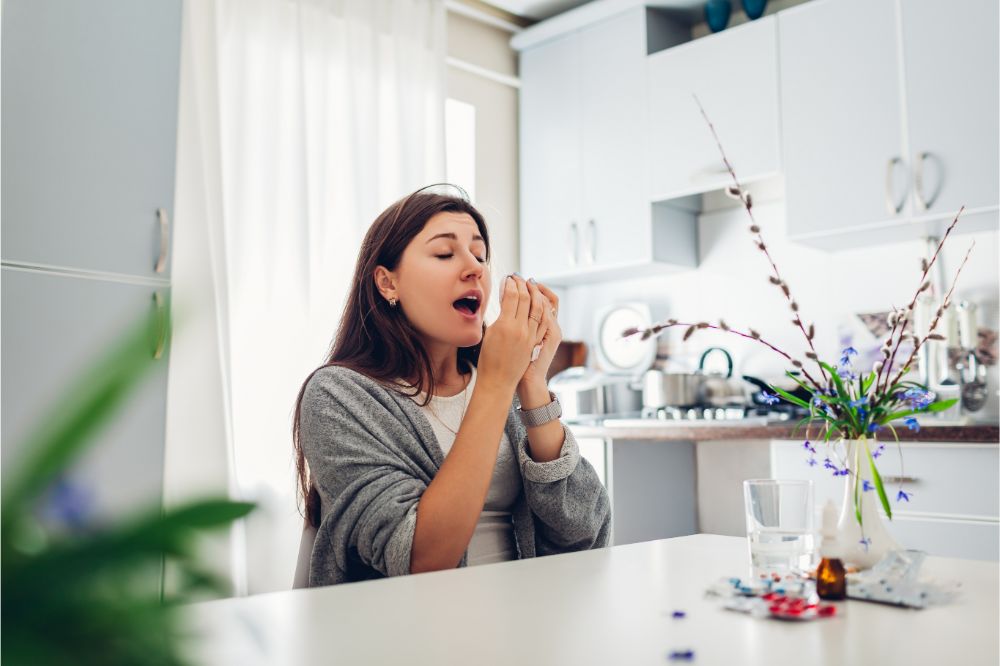When dealing with an allergy or cold symptoms, you might ask, “Can you take allergy and cold medicine?”
A common rule with some medications is that you typically wouldn’t take two simultaneously. However, allergy and cold medicine are different, with some exclusions.
To better understand how that is so, let’s first talk about the basics.
How Does Allergy Medicine Work?
Allergy medicine, also referred to as antihistamines, is a unique classification of over-the-counter medications.
They are designed to block the production of histamine, a chemical your body produces when it comes in contact with an allergen.
Histamines typically make the nose swell and itch, leading to a runny, itchy nose and often sneezing.
Although antihistamines reduce your body’s responses to allergens, they might not be as effective for fighting cold symptoms.
Older medications, such as chlorpheniramine and brompheniramine, could alleviate more cold symptoms than newer options like fexofenadine (Allegra) and loratadine (Claritin).

What Are the Dangers of Allergy Medicine?
When taking allergy medicine, it is essential to consider the type of antihistamines you are using along with other medications.
Some antihistamines contain painkillers and decongestants, similar to various types of cold medicine.
If you take these antihistamines on top of your existing cold regimen, you could be doubling up on painkillers that your body doesn’t need.
In these instances, this could lead to severe consequences, such as overdosing on over-the-counter medication.
There is also a considerable risk to your liver’s health, stomach bleeding, and intestinal damage.
Always check the label of your allergy medicine before taking it, along with other over-the-counter medications.
Other common side effects of antihistamines include:
- Dizziness
- Drowsiness
- Headaches
- Dry mouth
- Insomnia
- Raised blood pressure
How Does Cold Medicine Work?
Most cold medicines you will find at the pharmacy are classified as decongestants.
As a decongestant, they are designed to alleviate swelling in the respiratory tract, opening your nasal passageways as a result.
They can also assist with deep breathing, helping relieve pressure so that airflow is optimized.
You can find decongestants in pill form and as nasal sprays. They are also often added to cough syrup, assisting with creating more productive coughs to help loosen mucus.
The most important thing to note with cold medicine is that you will want to avoid formulas that contain phenylpropanolamine (PPA).
In 2000, researchers determined cough syrups with PPA led to increased strokes, primarily in women between 18 and 49.
As such, it has since been banned from appearing in all over-the-counter and prescription medications.
What Are the Dangers of Cold Medicine?
As with any over-the-counter medication, it’s important to note cold medicine’s dangers. That said, it is safe if you take it as instructed.
Most cold medicines have a combination of decongestants and painkillers, so be sure to dose yourself as per the instructions on the label.
The most important thing to note when taking cold medicine is if you have a codeine prescription.
Codeine, an opiate, is a popular ingredient in some cough medicines because it helps alleviate pain and coughing.
Unfortunately, it can be abused if consumed excessively, leading to considerable dependency.
A few other notable side effects you could experience when taking cold medicine with codeine include:
- Fever
- Headache
- Insomnia
- Blurred vision
- Drowsiness
- Shortness of breath
- Constipation
- Fast, irregular, or weak pulse
- Nausea or vomiting
Can You Take Allergy and Cold Medicine?
It is possible to take allergy and cold medicine at the same time, as long as you pay close attention to the medication labels.
By ensuring you are not taking twice as many painkillers or decongestants, both medicines can help.
However, it is also important to consider the symptoms of a cold and allergies to determine whether antihistamines and cold medicines are necessary.
If you think about it, the symptoms of colds and allergies are relatively the same. You could quickly treat both simultaneously by opting for either cold or allergy medicines.
In this instance, the main ingredients to ensure are in the medication’s formula include:
- Pain and fever reducer
- Decongestant (helps reduce stuffiness)
- Antihistamine (helps reduce sneezing)
- Cough reliever
If you find a medication with those components, it should alleviate much of your discomfort.
As mentioned, avoid doubling up on medicines. So, if one has acetaminophen as an active ingredient, don’t take a second medication with acetaminophen.

How To Take Allergy and Cold Medicine Safely
If you are interested in taking both medications at the same time, there are a few main things to consider.
1. Read the Label
The first thing you should do before taking any medication is to pay close attention to the label on the bottle.
Medicine manufacturers are required to provide safe dosage instructions on their products, and you should follow them to a T.
That said, you will want to look for a specific section in the information booklet that explains what not to take if you are using the medication.
This section will give you a clear idea of the medications that will negatively interfere with your drug regimen.
It should also give you some clarity as to what type of medications are safe to take together.
2. Talk to Your Doctor
Talk to your primary physician if you are truly concerned about taking more than one medication at a time.
Depending on your symptoms, your doctor can prescribe you an all-in-one medication.
They will also give you safe advice on what medications help and can be taken simultaneously.
You might find other therapies that can assist with your symptoms, especially if they have been a chronic concern.
With allergy or cold patients, many doctors will recommend following the dosage labels on both medications.
3. Consult a Pharmacist
If you cannot get in contact with your doctor, consulting a pharmacist is your best option for knowing what medicines are safe to mix.
These professionals have plenty of knowledge to recommend specific treatments for your symptoms.
Although they cannot diagnose an illness, they can surely assist with drug safety.
A Major Concern With Taking Cold and Allergy Medicine
Most adults can get away with taking cold and allergy medicine at the same time. However, the same cannot be said for children.
A recently published study by the FDA has cautioned parents against giving children antihistamines and cold medicine.
The study goes as far as to say giving more than one medication to a child at a time can be dangerous. This is particularly true if both medicines have the same active ingredient.
If you’re unsure as to how two medications will interact with each other, always consult your child’s primary care physician.
According to an FDA pediatrician, antihistamines can cause decreased oxygen and increased carbon dioxide in the blood, leading to breathing problems.
It is also known to cause sedation and agitation, which is where it becomes concerning for children.
If you double up on these medications, it could lead to serious concerns, such as liver damage.
Additionally, if both medications contain ibuprofen, children could suffer from diarrhea, nausea, and kidney failure.
It could also lead to disrupted heart rhythms and severe drowsiness.
As a parent, it’s always best to opt for one medication to help alleviate your child’s cold and allergy symptoms.
Is It Safe To Take Allergy and Cold Medicine at the Same Time?
The safest option when asking, “Can you take allergy and cold medicine?” is to rely on one medication at a time.
Always ensure the medicines you’re taking don’t have the same active ingredient, which can lead to overdosing.
Fortunately, most cold medicines also alleviate the symptoms of colds, allowing you to treat the reasons for your discomfort at once.